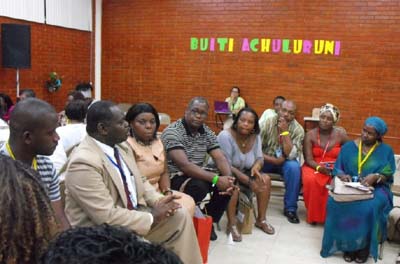Engaging the Indigenous in Honduras’ Development

Key Contact
Fabio Pittaluga
Start Date
End Date
Funding Amount
$ 84,637
Knowledge-receiving Countries
Summary
In Honduras, Afro-descendent and indigenous groups are among the poorest in the country, and lack a voice in development. The government approved a plan to involve them in development, and also created a Ministry to promote their welfare. However, indigenous groups were unclear about their needs and priorities, and public agencies did not have the capacity to promote these groups’ inclusion in development programs. In this context, the Organization for Communal and Ethnic-based Development (ODECO) in Honduras proposed that Afro-Honduran and indigenous groups participate in workshops with counterparts from seven Latin American countries to learn about integrating Afro-descendants into development programs. With support of the South-South Facility, ODECO organized a workshop as part of the World Summit for Afro-descendants held in La Ceiba in August 2011, and a second workshop in January 2012.
Delegates included officials from the public sector, private sector, civil society, and Afro-descendant and indigenous communities in Honduras, Peru, Brazil, Costa Rica, Ecuador, Guatemala, Nicaragua, and Panama. Many came from poor, remote communities, and took great pains to travel to the workshops. Delegates learned about tools for integrating the indigenous into development programs, including social auditing and citizen accountability mechanisms. Participants developed a comprehensive strategy outlining recommendations on health, education, inclusion, and other topics for Afro-Hondurans and indigenous communities. Participants presented this strategy to public officials, non-governmental organizations, beneficiaries, and stakeholders at the Presidential Palace in Tegucigalpa in March 2012.
Samuel Reyes, the Presidential Designee (Vice President) of Honduras, praised this strategy as a “a guide for development investment decisions to satisfy the needs of the indigenous and Afro-descendent peoples in the country.” Since these workshops, the government has begun to integrate the strategy into Honduras’ broader Strategic Plan for Development of Indigenous Peoples and Afro-Hondurans, and public agencies have begun to implement its recommendations across sectors.
Through this exchange, leaders of Afro-Honduran groups increased their voice in development and strengthened their commitment to involve communities in development planning. As one workshop participant noted, “The Government must continue to support [Afro-descendants] from not being excluded . . . I am taking a message to my community to get it involved.”
Beneficiaries / Participants
Reducing poverty in Honduras requires integrating Afro-descendent and indigenous groups into development planning and programs, as such groups are among the lowest income earners and lack a voice in decision-making. To enhance the welfare of these groups, the Government has approved a National Plan to increase their participation in development, and created a Ministry to support their inclusion: the Secretaría de Estado para el Desarrollo de los Pueblos Indígenas y Afrohondureños (SEDINAFROH). However, government agencies and community organizations have been unclear on their needs and priorities, and lacked the know-how and skills to design and implement programs engaging these groups.
In Honduras, the Organization for Communal and Ethnic Based Development (ODECO) – an internationally renowned organization advocating indigenous rights – proposed that the World Bank support workshops on integrating Afro-descendants into development. The first would be held during the ODECO’s World Summit for Afro-Descendants in La Ceiba in August 2011. ODECO proposed a workshop at this Summit to learn about the experiences and lessons of leaders of Afro-descendant communities, and diverse agencies and stakeholders from Brazil, Peru, Costa Rica, Ecuador, Guatemala, Nicaragua, and Panama. A second workshop in January 2012 to deepen learning on identified topics and lessons and develop a strategy for social inclusion was planned. These workshops, which were partly funded by the South-South Facility, included delegates from poorer, indigenous communities who traveled far by bus, car, and plane to participate.
Moving forward
Honduran officials and stakeholders have taken steps to disseminate and apply the strategy and lessons from the workshop. Officials have disseminated the strategy within SEDINAFROH, the Secretaría Técnica de Planificación y Cooperación Externa (SEPLAN), and the Instituto Nacional de Estadistica (INE). Government agencies across sectors have begun to incorporate its recommendations. As a likely result of this strategy, the national census in Honduras added a variable for indigenous and Afro-Honduran peoples. Afro-Honduran groups have used the strategy to question candidates for the Presidency of Honduras. Reflecting greater attention on indigenous issues, the President in late 2013 awarded property titles, which were under dispute with Honduras’ military, to the Garifuna people of Punta Gorda on the country’s northern coast.
In addition, the workshops pointed to new directions for government and donor support. For example, community leaders want to develop youth leadership programs in La Ceiba and the Atlantida Region, where organized crime and drug trafficking have taken a toll on youth welfare. Leaders have also prioritized programs promoting gender equality.

 China
China Colombia
Colombia Denmark
Denmark India
India Indonesia
Indonesia Mexico
Mexico Russian Federation
Russian Federation Spain
Spain United Kingdom
United Kingdom